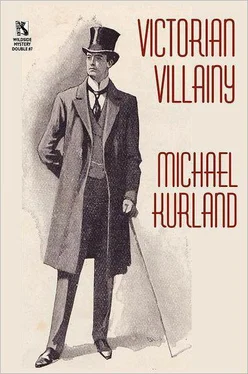Michael Kurland - Victorian Villainy
Здесь есть возможность читать онлайн «Michael Kurland - Victorian Villainy» весь текст электронной книги совершенно бесплатно (целиком полную версию без сокращений). В некоторых случаях можно слушать аудио, скачать через торрент в формате fb2 и присутствует краткое содержание. Жанр: Классический детектив, на английском языке. Описание произведения, (предисловие) а так же отзывы посетителей доступны на портале библиотеки ЛибКат.
- Название:Victorian Villainy
- Автор:
- Жанр:
- Год:неизвестен
- ISBN:нет данных
- Рейтинг книги:5 / 5. Голосов: 1
-
Избранное:Добавить в избранное
- Отзывы:
-
Ваша оценка:
- 100
- 1
- 2
- 3
- 4
- 5
Victorian Villainy: краткое содержание, описание и аннотация
Предлагаем к чтению аннотацию, описание, краткое содержание или предисловие (зависит от того, что написал сам автор книги «Victorian Villainy»). Если вы не нашли необходимую информацию о книге — напишите в комментариях, мы постараемся отыскать её.
Victorian Villainy — читать онлайн бесплатно полную книгу (весь текст) целиком
Ниже представлен текст книги, разбитый по страницам. Система сохранения места последней прочитанной страницы, позволяет с удобством читать онлайн бесплатно книгу «Victorian Villainy», без необходимости каждый раз заново искать на чём Вы остановились. Поставьте закладку, и сможете в любой момент перейти на страницу, на которой закончили чтение.
Интервал:
Закладка:
I related my experiences of the day, and he nodded thoughtfully and went “hmmm” twice. “Englanders,” he said. “Interesting. I think the game’s afoot.”
“What game are we stalking, Holmes?” I asked.
“I have seen some of your ‘Englanders,’” he told me. “In the Ludwig Hof shortly after lunch. I was enjoying a cassis and being expansively French when three men walked in and sat near me. They tried to engage me in conversation in English and German and, when I effected not to understand, bad French. We exchanged a few pleasantries and they tipped their hats and began speaking among themselves in English, which, incidently, is not as good as their German.”
“Ah!” I said.
“They insulted me several times in English, commenting with little imagination on my appearance and my probable parentage, and when I didn’t respond they became convinced that I couldn’t understand and thereafter spoke freely.”
“Saying?”
“Well, one thing that will interest you, is that Holmes and Moriarty are dead.”
“Really? And how did they die?”
“There was this great fight at Reichenbach Falls, and they both plunged in. Their correspondent saw it happen himself. There could be no mistake.”
I stared out the window at the snow covering a distant mountain peak. “Oscar Wilde says that people who are said to be dead often turn up later in San Francisco,” I said. “I’ve never been to San Francisco.”
Holmes stared intently down his long nose at me. “I don’t know what to make of you,” he said. “I never have.”
“So, now that we’re officially dead,” I said, “what do we do next?”
“When the faux Englishmen left the room,” Holmes continued. “I followed them. They went to the waterfront.”
“I trust you were not seen,” I said.
Holmes fastened a withering glare on the painting of an alpine meadow on the far wall. “When I don’t wish to be seen,” he stated, ‘I am not seen.”
“Silly of me,” I said. “What did you observe?”
“They entered a large warehouse next to a pier jutting into the lake. Attached to a short line by the warehouse door-”
“Three clothespins,” I ventured.
“Three white clothespins,” he corrected.
“Well,” I said. “Now we know where.”
“Not quite,” Holmes said. “I observed several more people entering the warehouse over the next hour. And then a door opened on the water side of the building, and the men boarded a steam launch named the Isolde, which was tied up to the pier next to the building. It then chuffed out onto the lake and away. I investigated and discovered that now there was only one man, an old caretaker, left in the warehouse.”
“Ah!” I said.
“The boat returned about an hour ago. Some men got off. A few of them were the same men who had boarded earlier, but not all.” he tapped his long, thin forefinger on the table. “They’re doing something out there somewhere on the lake. But it’s a big lake.”
“That presents an interesting problem,” I said. “How do we follow them over open water?”
Holmes stared out the window. “A two-pipe problem,” he said, pulling out his ancient brier and stuffing it with tobacco. “Perhaps three.”
Having smelled the foul mixture he prefers to smoke, I excused myself and went downstairs, where I indulged in a kaffee mit schlag. Mit, as it happens, extra schlag. About an hour later Holmes came downstairs, gave a slight nod in my direction and went out the front door. After a suitable time I followed. Night had fallen, and the streetlights were sparse and dim. A chill wind was blowing in off the lake.
Holmes was standing in the shadow of an old stable a block away. I smelled the foul tobacco odor emanating from his clothing before I actually saw him.
“Commandant Vernet,” I said.
“Herr Stuhl.”
“Have your three pipes shown the way?”
“If we had time we could build a large observation balloon and watch them from high aloft,” Holmes said. “But we have no time. I think one of us will have to stow away on that steam launch and see where she goes.”
“If nominated I shall not run,” I told him firmly, “and if elected I shall not serve.”
“What’s that?”
“The American General Sherman. I am taking his excellent advice.”
Holmes looked at me with distaste. “With all your faults,” he said, “I didn’t picture you as a coward.”
“And neither am I foolhardy,” I told him. “There is little point in indulging in a foredoomed course of action when it will accomplish nothing and merely succeed in getting one killed. Remember Alphonse Lamphier.”
Holmes stared glumly into the dark. “I have nothing better to offer,” he said. “In large parts of the ocean ships leave a phosphorescent wake that lasts for some time, I understand, but not in lakes, however large.”
“What an excellent idea!” I said.
“A phosphorescent wake?”
“A wake of some sort. The craft will go wherever it is to go, and we shall follow in its wake.”
“How?”
“A moment,” I said, staring into space. “Why not oil? Some light oil dyed red should do it.”
“Brilliant!” said Holmes. “And who shall we get to sprinkle this oil on the water as the boat progresses?”
“We, my doubting Sherlock, shall construct a mechanism to do the task,” I said.
And so we did. The next morning I procured a five gallon drum of fish oil, which seemed appropriate, and took it down to a deserted jetty which Holmes had observed yesterday in his wanderings. I then went back to the main street and returned with a pair of iron exercise dumbbells, purchased from a junk shop. Holmes joined me shortly after, bringing a coil of quarter-inch marine line and a small bottle of red dye; some sort of pastry dye I believe, which we added to the oil. It seemed to mix satisfactorily, so we busied ourselves affixing some handles on the drum with metal screws. The screw holes would leak slightly, but that didn’t matter.
We changed into recently purchased bathing costumes and rented a two-man rowboat, wrapping our clothing and other items we might need in oilcloth and stowing them on the bottom of the small craft. After about twenty minutes rowing along the shore we came in sight of the pier in question. The steam launch Isolde was tied up alongside.
There appeared to be no one on watch in the launch, so we came up as quietly as possible to the opposite side of the pier and tied our boat to a convenient hook. Slipping into the chill water, we towed the drum of oil under the pier to the starboard side of the Isolde. We could hear the deep chugging of the steam engine as we approached the boat, which suggested that there would shortly be another journey.
I screwed two four-inch wood screws into the hull near the stern, and fastened one end of a twelve-foot length of marine line to them. The other end Holmes fastened to the oil drum. My calculations indicated that it would take the weight of both of the iron dumbbells to keep the drum submerged, so the two of them were tied firmly onto the sides of the drum. All that remained was to put a screw into the cork plugging the drum’s bunghole and attach it by a short line to the pier. That way as the steam launch left the pier, the cork would be pulled and the drum would begin leaking colored oil.
As we were completing this last task we heard footsteps above us on the pier, and the voices of the pseudo Englanders as they began boarding the launch. They all spoke English, those who spoke, and their accents were slight. Yet of all the myriad of home-grown accents which pepper the British Isles, allowing one man to despise another who grew up twenty miles to his north, these were none.
After about ten minutes the boarding was completed, the chugging of the steam engine grew louder and deeper, and the Isolde puled away from the pier. There was a slight but satisfying pop as the cork was pulled from the oil drum, and it began its journey bobbing out of sight behind the steam launch, spilling red oil as it went.
Читать дальшеИнтервал:
Закладка:
Похожие книги на «Victorian Villainy»
Представляем Вашему вниманию похожие книги на «Victorian Villainy» списком для выбора. Мы отобрали схожую по названию и смыслу литературу в надежде предоставить читателям больше вариантов отыскать новые, интересные, ещё непрочитанные произведения.
Обсуждение, отзывы о книге «Victorian Villainy» и просто собственные мнения читателей. Оставьте ваши комментарии, напишите, что Вы думаете о произведении, его смысле или главных героях. Укажите что конкретно понравилось, а что нет, и почему Вы так считаете.










![Brian Thompson - A Monkey Among Crocodiles - The Life, Loves and Lawsuits of Mrs Georgina Weldon – a disastrous Victorian [Text only]](/books/704922/brian-thompson-a-monkey-among-crocodiles-the-life-thumb.webp)

